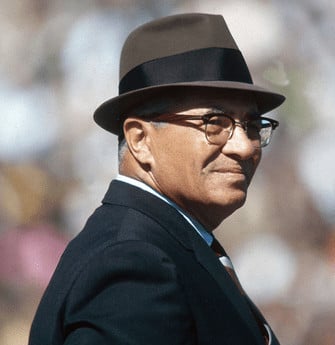Coaches all agree on its importance, but how to motivate athletes?
Sports coaches and players look for motivation from a variety of sources. Motivation may come from parents and family members, past disappointments, previous successes, competitors’ words, professional players, and elsewhere. A motivated team can compete at a very high level. But, if you’re missing that extra oomph, a squad can fall to a lesser team.
Here are some coaching considerations for you.
15 Tips For How to Motivate Athletes

1. Confidence is King.
In sports, as in other pursuits, frequently, there’s just not that much of a difference between competitors. Being just a little better makes the difference between a win and a loss. That small difference is frequently attributed to one team playing with more confidence.
How do you help players gain confidence? It happens first and foremost during practices. Preparation is key. Implement practice plans that make sense. Set achievable and age-appropriate goals. Put players in a position to succeed and sing their praises when they do. Enable kids to make mistakes without punishment. Identify progress. Applaud the effort, even if the results fall short.
2. Make fun a priority — How to Motivate Athletes
When planning each practice, think about three things:
A.) What is the one key concept you hope your team will learn today?
B.) What activity will players have so much fun with that they’ll be talking about it on the way home?
C.) How can I keep things fun and interesting throughout the whole practice? It might mean adding some competition to a drill. It could entail giving players a vote between 2 activities. Experiment. Discover what gets your team excited and come back to favorites when you need a lift.
3. Let kids be kids.
While having the best win/loss record might be a high priority for a coach, many players participate in sports for different reasons, e.g. hanging out with friends, staying in shape, etc. Plus, with all of the other activities and commitments a kid might have, elevating every team activity to the top of the list will be difficult for some.
Let kids be kids and enjoy other pursuits, even during your sports season. A school ski trip might interfere with basketball practice for a player. Let them go without punishment. Put on your parent hat and take off your coach hat for a second. Your team will appreciate a coach who views each player as a whole person. And, if you’re doing a good job of teaching and making practices interesting, players will not want to miss team events.

4. Motivational lessons are best taught at practices, not in pre-game speeches.
With the excitement of their families at games and the nervousness that comes before game time, the big “win-one-for-the-Gipper” speeches are best left for feel-good sports movies. The time to teach and make important points about the game and approach is during class – and class time for coaches and players is at practices.
Right before games, you can remind players of some important concepts, but ideally, these topics have been previously covered during practice time. Kids are generally so excited for games that the best approach is usually to just try to get them to relax a little.
5. Read the room — How to Motivate Athletes
At each practice and game, a good coach will try to get a read on the pulse of his team. Do your players look tired and worn out at a late practice? Time to ease up on the pedal. Are they over-amped for a big game? Try to get players to relax by telling a humorous story from their youth. As a coach, sometimes your agenda will need to be adjusted. Be alert, and be prepared to adapt your plans based on the situation.
6. Show your players you care about the whole person.
It’s a great idea for coaches to meet with their team 10 minutes before taking the field or court. During these times, a coach can speak to motivation, the value of hard work, controlling emotions, and other life lessons via stories and discussions that resonate with your players. A coach might share personal stories or stories of well-known sports stars or lead a discussion and invite players to participate. These short talks before practice, which are then reinforced with short messages during practice and after games, lay the foundation for teaching life lessons to your team.
7. Effective coaching begins with trust — How to Motivate Athletes
For players to buy into a program, they need to trust the source. You begin to build trust by showing interest, being prepared, and treating people fairly. Yell less. Smile more.
8. Set realistic expectations for yourself.
Young players make mistakes – lots of them. This is a given. This should not come as a shock. Don’t act surprised. Making mistakes is part of the learning process.
Young players especially, but players of all ages, can be insecure about their abilities. A well-timed boost of confidence administered by a coach can do wonders.
What have you done differently as a team during practices that will give you a better shot at success in the next game? Remind players of what that is. Teams and groups of people need a flag to rally around. Maybe your team has placed a huge emphasis on defense or shot more free throws. Let your players know at the last practice before a big game that “we’re going to win this one because of all of the efforts you’ve put into defense – our defense will be the difference in this game.” Some well-deserved praise goes a long way toward building confidence.
10. Respect and coach everyone – not just the best players.
Not only is it the right thing to do for player development, but it can also make a huge difference in the development of your team.
Developing strong skills amongst all of your players will make you a very difficult team to compete against. Look for opportunities to include all of your players in key roles in game situations.
11. Model good behavior — How to Motivate Athletes
Players will evaluate how the coaches act under pressure – make sure you’re setting a good example. Disputing every call and screaming from the sidelines is not something you want to pass on to your players.
12. “Shout praise and whisper criticism.”
As basketball coaching legend Don Meyer said, “Shout praise and whisper criticism.” When it’s good news, tell the world. But when it’s an opportunity aimed at an individual player, work with that player quietly.
When you catch somebody doing something right during practice, stop everything and have the player demonstrate it for the entire team. Oh, and over the course of the first five practices, make sure you catch every player doing something right.
13. Communication is key — How to Motivate Athletes
Two-way communication is important. Create an environment where players feel comfortable asking questions. You want to have smart players. Be a smart teacher.
14. Connect with players’ parents.
To better understand your players and for a smoother sailing ship, it helps to develop an early and ongoing communication stream with your players’ parents. Meet with parents early and explain your approach and expectations. Keep parents in the loop throughout the season. Involve players’ parents in team activities where it makes sense. When parents and coaches are on the same page, there’s harmony for players.
15. Sell your program to your players.
As a coach, you’re constantly selling your program. You want players that buy in and give 100% effort.
Every team function presents an opportunity. Help players understand “the why”. Why we’re playing this defense? Why this drill is important? What will this activity teach you? Why we’ve improved as a team?
Effectively selling in your program and approach gives your players confidence. At the end of the day, your design should be to develop a self-motivated team. A team that recognizes that there’s satisfaction that comes with a job well done.
Coaching Legends’ Style
Did you know that 2 of the greatest sports legends – Arnold Palmer and Vince Lombardi – were motivated by the same poem? I was talking with former Minneapolis TV sports photographer John Gross, and he told me a neat story about Arnold Palmer and how he drew inspiration from a particular poem.
Arnold Palmer is considered to be one of the greatest golfers of all time. He helped popularize golf as one of its first TV stars and was an original inductee into the World Golf Hall of Fame. Heck, he even has a drink named after him. Order an “Arnold Palmer,” and you’ll get an iced tea and lemonade.
Vince Lombardi, best known for his Green Bay Packers teams, is the most successful coach the NFL has ever known. There’s a reason the Super Bowl trophy bears his name. Both turned to Walter Wintle’s “Thinking” poem for inspiration throughout their lives.

Arnold Palmer and the Thinking Poem
Palmer carried a copy of the “Thinking” poem and posted it in his locker wherever he played. He has a plaque of the poem in his office and repeats the words nearly every day. In the solitary sport of championship golf and in daily life, Palmer recognized the importance of self-motivation.

In the team sport of NFL football, where Lombardi was in charge of motivating grown men, he, too, knew that confidence was king. Automaker Henry Ford and best-selling author Napoleon Hill frequently quoted this same poem.
What was so magical about the poem? Well, take a look and judge for yourself.
Thinking
If you think you are beaten, you are;
If you think you dare not, you don’t.
(And) If you’d like to win but you think you can’t,
It is almost a cinch that you won’t. If you think you’ll lose, you’re lost;
For out of the world, we find
Success begins with a fellow’s will
It’s all in the state of mind. If you think you’re outclassed, you are;
You’ve got to think high to rise.
You’ve got to be sure of yourself before
You can ever win the prize. Life’s battles don’t always go
To the stronger or faster man;
But sooner or later, the man who wins
Is the one who thinks he can!
by Walter Wintle
About Walter Wintle
Little is known about the author Wintle, but his message in this poem is clear: to be successful, you need to believe in yourself.
Instilling self-confidence in players is critical, but what other ways can a coach motivate players? There’s no simple answer. Most motivational experts and successful coaches will tell you it takes time, commitment, and hard work.
There’s no one silver bullet. Coaches learn over time concepts that work well and others that don’t. Learning how to motivate is an ongoing process where the best strive to get better. They read. They listen to experts. And they experiment. It’s not easy, but the rewards can make all of the efforts worthwhile.
Here are some suggestions that should point you in the right direction.
By Mike O’Halloran
Mike O’Halloran is the Founder of SportsFeelGoodStories.com, a long-time youth sports coach, and the publisher of the line of practice plans and award certificates. Thanks to John Gross for suggesting the “Thinking” poem, which also happens to be his favorite poem.
Etcetera
You’re on the How to Motivate Athletes page.
You might like:
Guide for starting a sports website
